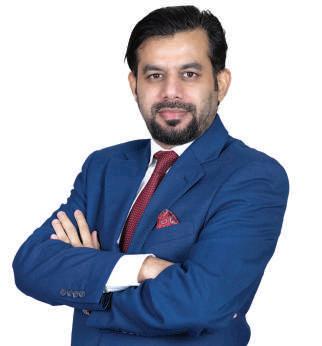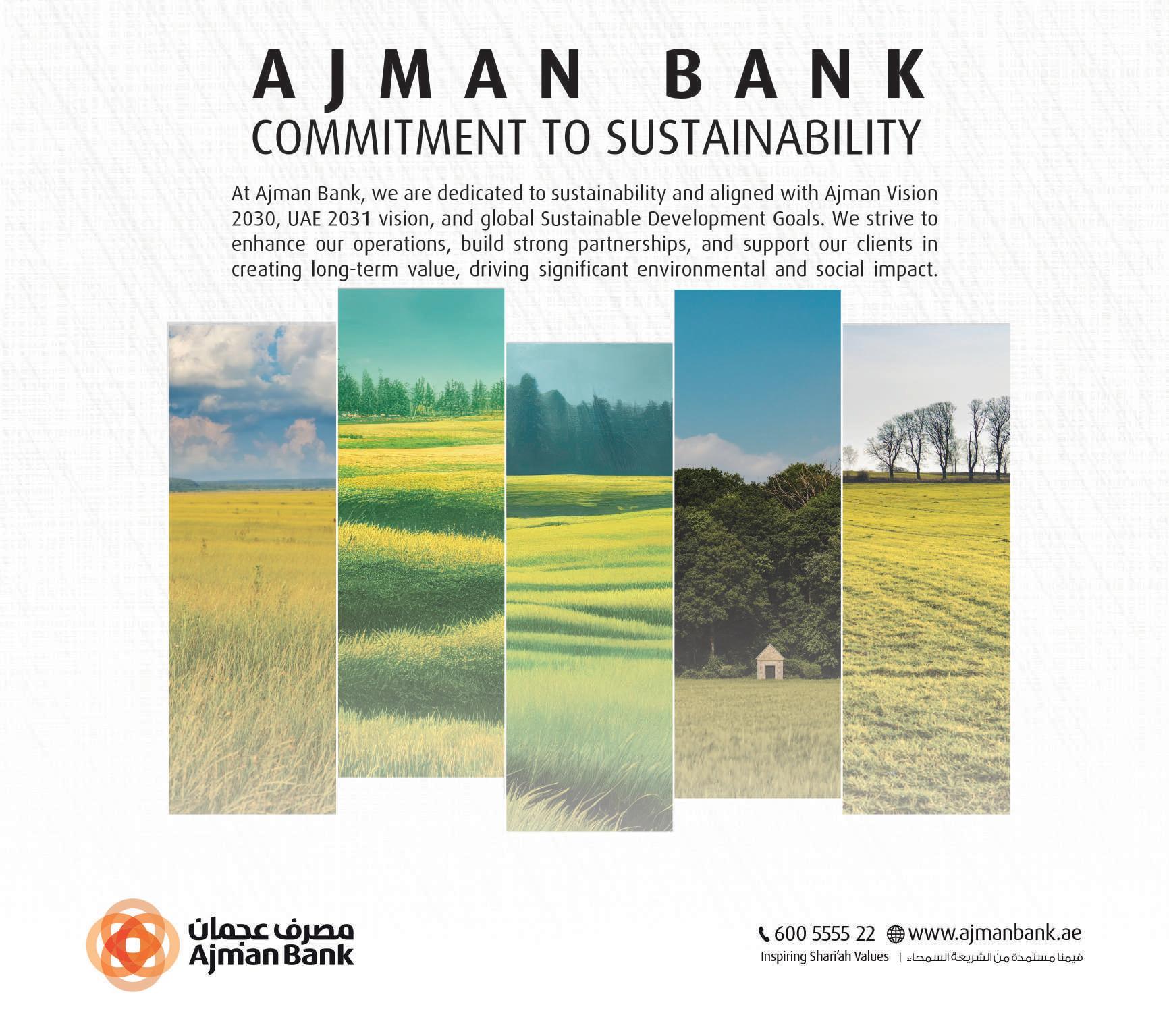ESG AND UAE BANKING



UAE banks are emerging as a leader in adopting policies and regulations that are expected to strengthen green finance in coming years
Muzaffar Rizvi
UAE Banks Federation recognises the growing importance of Environmental, Social and Governance (ESG) factors in the financial landscape and playing a pioneering role in sustainable finance to achieve net-zero goals by 2050, its top official says.
Jamal Saleh, Director-General, UAE Banks Federation (UBF), said UAE banks are emerging as a leader in adopting policies and regulations that are expected to strengthen green finance in coming years.
“UBF promotes integrating ESG consciousness into lending and borrowing policies. We anticipate a regulatory mandate for banks to fully integrate ESG risks into their risk management frameworks,” Saleh told Khaleej Times during an interview.
He said UBF recognises the importance of addressing climate change issues and has taken steps to support the sector under the direct supervision of the Central Bank of the UAE.
Excerpts from the interview:
What is the opinion of the UBF about the importance of ESG policy in the banking sector of the UAE?
UAE Banks Federation views ESG as a strategic imperative, not merely a compliance requirement, for the UAE banking sector. It is considered a catalyst for sustainable economic growth and a cornerstone of the UAE’s Green Agenda
2030 and net-zero 2050 goals. The UAE’s pioneering role in sustainable finance is underscored by its contribution of around 30 per cent to the region’s total green bond issuance, surpassing the global norm.
At the same time, Central Bank of the UAE has established the UAE Sustainable Finance Working Group (SFWG) in 2019 and Guiding Principles on Sustainable Finance in 2021, underscoring the country’s commitment to supporting the transition to a net-zero economy. These developments reflect the deepening importance of ESG policies and products in the future profitability of UAE banks. Meanwhile, by integrating ESG considerations into their core operations, UAE banks are driving positive change.
2023 marked an unprecedented surge in the green bond market, with an alltime high of $310 billion issued in the first six months, accounting for 59 per cent of the total Global Sustainable Bond Market (GSSSB), which was expected to hit approximately $1 trillion by the yearend and accounted for 14 per cent-16 per cent of total bond issuances. UAE banks, in line with Central Bank of the UAE’s vision, are emerging as a leader in adopting policies and regulations that are expected to strengthen green finance further, driven mainly by governmental initiatives in sustainability, projects a bright future for green financing.
What are the ESG risk drivers and sustainability issues in the banking sector? What steps has UBF taken for this?
Climate change poses a significant risk to the Middle East and North Africa (Mena) region’s financial sector, including the banking industry. Rising temperatures threaten agriculture, energy, water resources, coastlines, and tourism, impacting banks’ loan portfolios and operational resilience. We anticipate a regulatory
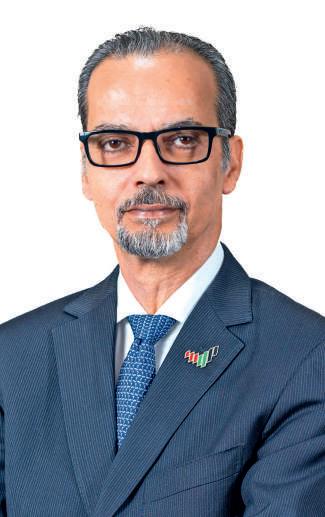
We are committed to providing strategic guidance, facilitating knowledge sharing, and advocating for supportive policies to empower banks in their sustainability journey.”
Jamal
Saleh, Director-General, UAE Banks Federation
mandate for banks to fully integrate ESG risks into their risk management frameworks.
UBF recognises the importance of addressing these challenges and has taken steps to support the sector under the direct supervision of the Central Bank of the UAE. As the sole representative of UAE banks, we provide a platform for

knowledge sharing and collaboration on ESG best practices. We are working closely with the Central Bank to advance ESG policies within the banking sector. According to a recent Ernst and Young survey, 60 per cent of the banks surveyed said to integrate ESG into risk management. There is still room for improvement, and UBF is committed to driving further advancements in this area.
UAE national banks have been reported to have committed to supporting sustainability projects worth Dh1 trillion by 2030. What can you tell us more about this commitment? How is the UBF supporting these banks?
The UAE banking sector’s pledge to allocate Dh1 trillion to sustainability projects by 2030 is a historic step towards the UAE’s green economy goals. This ambitious commitment underscores the sector’s recognition of its pivotal role in driving sustainable development. We are privileged to have played a pivotal role in mobilising the banking community around this shared vision. We are committed to providing strategic guidance, facilitating knowledge sharing, and advocating for supportive policies to empower banks in their sustainability journey. Our efforts have focused on enhancing banks’ capabilities to assess ESG risks, develop sustainable products, and measure environmental impact.
S&P Global Ratings predicts sustainable bond issuance is projected to reach nearly $1 trillion in 2024, indicating a global surge that likely includes significant contributions from the UAE. UAE banks have responded by expanding their green financing portfolios, issuing green bonds, and developing innovative ESG-linked products to meet the evolving needs of customers and investors.
For example, Masdar raised $750 million in a debut sale of green bonds in 2023, signalling increased investor in-
The UAE banking sector’s pledge to allocate Dh1 trillion to sustainability projects by 2030 is a historic step towards the UAE’s Green Economy goals.
terest in renewable energy projects.
We are confident that through continued collaboration and strategic initiatives, the UAE banking sector will achieve the Dh1 trillion target and solidify the nation’s position as a global leader in sustainable finance.
How is the UBF ensuring that banks in the UAE are implementing ESG standards and policies?
UBF recognises the growing importance of ESG factors in the financial landscape.
It is actively driving its integration into UAE banks’ operations by encouraging green financing and bond issuance, promoting sustainable practices across the value chain, and supporting carbon footprint reduction. In collaboration with the Central Bank of the UAE and other stakeholders, we are developing a robust ecosystem and accountability standards while fostering a culture of sustainability within the banking sector. Key initiatives include aligning with the central bank’s regulations, developing ESG performance benchmarks, providing training programmes for bank staff, and facilitating peer-to-peer learning, all aimed at contributing to the UAE’s transition to a low-carbon economy and building a resilient financial system.


ADIB is a leading Islamic bank, committed to developing new sustainability-linked financing solutions to help customers transit to a low carbon economy and tackle key environmental challenges.
Recognised for our innovation, customer services and digital capabilities, we support our customers’ business needs, equip people with the skills they need and financially empower our younger generations.
ADIB is your life long partner.

Emirates NBD prides itself on offering sustainable and innovative financial solutions to facilitate the transition towards a sustainable economy
s consumers and inves-
Ators prioritise organisations with a clear commitment to sustainability in solutions and operations, placing equal emphasis on profitability, social and environmental values is critical to business growth. Emirates NBD’s ESG Strategy involves continuous efforts to embed sustainability within the Group.
Financial institutions are at the heart of a sustainable and lowcarbon economy. Committing to environmental sustainability as a corporate responsibility to build a sustainable future for stakeholders and the communities served by the bank, reaffirms our alignment with the UAE’s Net Zero 2050 Strategy.
Emirates NBD prides itself on offering sustainable and innovative financial solutions to facilitate the transition towards a sustainable economy. The launch of our Sustainable Finance Framework, a debut issuance of a $750 million Green Bond, co-chairing the Middle East and North Africa chapter of the Partnership of Carbon Accounting Financials, joining the Partnership of Biodiversity Accounting Financials, debt instruments that support sustainability and ESG factors, setting up an Environment and Social Risk Policy Framework and leading by example as the principal banking partner at COP28, are some notable initiatives Emirates NBD has undertaken. Additionally, the group is a leader in green car financing for UAE customers and the first bank to offer carbon futures contracts trading.
As a socially responsible bank, Emirates NBD continues its inter-
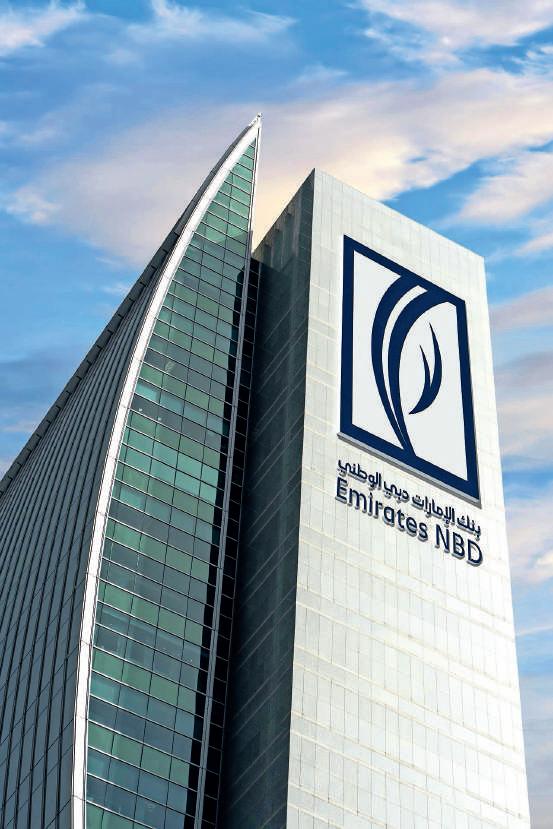
As a socially responsible bank, Emirates NBD continues its internal sustainability journey by reducing operational emissions and increasing green projects investment to reduce financed emissions.
nal sustainability journey by reducing operational emissions and increasing green projects investment to reduce financed emissions. The group has advocated green buildings for years, leading to a partnership with the Emirates Green Building Council and achieving the global leadership with the highest number of Leadership in Energy and Environmental Design (LEED) Platinum certifications from the US Green



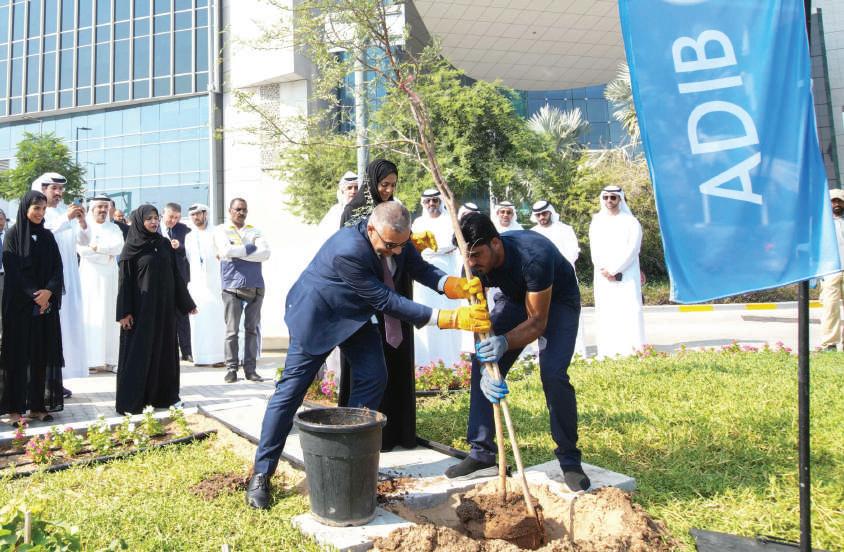
ADIB Group is setting industry benchmarks toward building more sustainable, diverse and equitable communities
ABuilding Council, raising the number of LEED gold and platinum certifications to 35. These initiatives support UAE’s Green Agenda 2030 and encourage organisations to re-evaluate their buildings to reduce emissions.
Emirates NBD’s role in supporting economies extends beyond banking to enabling job creation, driving value for local businesses, and actively participating in key sectors.
DIB continues to deliver on its sustainability ambitions of unleashing the untapped sustainability potential within the Islamic finance space, achieving significant milestones in its Environmental, Social, and Governance (ESG) performance. With a strategic vision encompassing positive ESG impacts and capitalization on sustainability opportunities, ESG is a pillar of how ADIB develops its bank-wide corporate strategy. ADIB has been able to progress quickly in its sustainability journey, with significant operational, governance, and policy changes that have rooted sustainability into the bank’s processes. Most recently awarded as the best Islamic bank for ESG by the Euromoney Awards 2024 among other awards, the bank has consistently been recognised as an industry leader in the sustainability arena. As a forward-thinking institution, ADIB integrates sustainabil-

Deeply ingrained in the community, ruya places a high priority on providing support for families, entrepreneurs and small businesses
Latha Krishnan
“Being an ethical Islamic community bank ruya accords top priority to Environment Social Governance (ESG) principles to all its operations and align with its core values of transparency, fairness and social responsibility. Our ESG policy reflects the tenets of Sustainable Islamic Finance issued by the Central Bank of the UAE. Sustainability is central to all our products and decision making,” says Christoph Koster, CEO of ruya.
One of the most recent green initiatives by ruya is ‘NatureProtect’, a unique way to save the environment as you save money.

Christoph Koster, Chief Executive Officer of ruya
ity into every aspect of its operations and business, shaping a future where financial success aligns with environmental stewardship, social progress, and robust governance. Progress in green finance has been a major marker of this year’s achievements, with an ambitious net-zero journey underway. The bank has successfully baselined and set quantitative sectoral targets for its high-impact sectors, targeting key sectors such as home finance, auto finance, real estate, air transportation, utilities, and petroleum manufacturing. With a year-on-year reduction of 65 per cent in Scope 1 emissions registered in 2023, the bank has already begun delivering on its goals to decarbonise. ADIB has also achieved a major milestone by issuing the world’s largest green sukuk issued by a financial institution, raising $500 million. This, coupled with a sustainable finance portfolio that reached Dh5.567 billion in 2023, underscores ADIB’s dedication to integrating sustainability into its financial products and services. This proactive approach positions ADIB as a leader amongst Islamic financial institutions in the transition to a green economy. On the retail front, ADIB has made swift progress in addressing the needs of consumers for green products, including a green vehicle financing product (VOLT), and solu-
tions for customers seeking to retrofit properties with solar panel systems. These significant changes are supported by robust governance characterised by the highest ethical standards. The bank’s governance framework prioritises transparency, accountability, and regulatory compliance, building trust with stakeholders and setting a strong example for ethical business practices.
In terms of social impact, ADIB is committed to uplifting communities and promoting diversity. The bank supports educational programmes, healthcare projects, and social welfare initiatives that provide tangible benefits. Additionally, ADIB completed 1,902 hours of ESG training in 2023, highlighting its focus on employee development. The bank’s community engagement extends to over 30 organisations, focusing on financial inclusion, youth opportunities, health, and culture. As a signatory to the UNEP FI Principles of Responsible Banking and a participant in COP28, ADIB reinforces its role as a pioneer in responsible banking. Recent high ratings from MSCI and S&P’s Corporate Sustainability Assessment further validate ADIB’s exceptional ESG performance, setting a benchmark for the sector and demonstrating how financial institutions can integrate sustainability into their core activities for a better future.
UBF Playing a Pioneer Role to Achieve Net-Zero Target by 2050
From Previous Page
Is the UBF advising banks to reflect ESG consciousness in their lending and borrowing policies?
UBF promotes integrating ESG consciousness into lending and borrowing policies. To align with government climate change plans, banks need to establish robust criteria and governance processes for managing sustainable transactions. This includes fostering open banking initiatives and driving sustainability efforts prioritising ESG principles.
ensuring long-term returns and protection against poor environmental policies, lack of social consciousness, or bad governance.



“For every Dh1,000 a customer adds to their account with ruya, we conserve one square foot of primary forest area for a period of 10 years. There is no limit to the forest area being saved, and customers can see how much forest they are saving in ‘real time’ as
their app will not only reflect their financial balance but also their forest conservation balance next to it,” explains Koster. Transactions with ruya are conveniently done over their mobile banking app. Moreover, ruya’s community centres are paperless and foster energy efficiency. They also offer financial literacy to customers to empower them with financial knowledge and fraud awareness. Everyone can have an account with ruya as there is no minimum balance required, and no minimum or hidden fees. To open an account all one needs is the UAE PASS or an Emirates ID. In addition, ruya also facilitates ease of doing business to SMEs and is committed to digital innovation to keep on expanding its products and services.
The UAE is leading in ESG and sustainability efforts through frameworks like the UAE Vision 2021, UAE Green Agenda 20152030, Dubai Plan 2021, and the Paris Agreement. Initiatives such as the National Committee on SDGs and the Dubai Declaration on Sustainable Finance exemplify this commitment. Banks are expanding product offerings to include ESG advisory services, sustainable finance, and green deposits. According to EY, nearly three-quarters of top Mena banks have introduced ESG strategies, with 45 per cent establishing sustainable finance frameworks linked to international standards like the ICMA’s Green Bond Principles.
Global investors, including sovereign wealth funds, are increasingly allocating capital to companies prepared for a green economy, highlighting the longterm benefits of ESG adherence. PwC estimates that the global ESG assets market may exceed $53 trillion by 2025. UAE investors are expected to follow these trends, with growing interest in sectors like renewables. By incorporating ESG factors, investors can better assess businesses for risk mitigation and uncover opportunities,
Please provide any other/ additional instances of UBF and its role in ESG policies. Through its high-level ESG committee, comprising experts from UBF member banks, the Federation’s initiatives reinforce green finance principles and frameworks, aligning with the UAE’s commitment to sustainability in the banking and financial sector. The UAE has adopted sustainability standards and principles in the banking and financial sector, with the Guiding Principles for Sustainable Finance in 2020 and the National Framework for Sustainable Finance in 2021. We are confident that the UAE banking sector can significantly contribute to the UAE’s Green Agenda 2030 and net-zero 2050 goals. The UAE’s financial sector is poised to lead the way towards a greener and more sustainable future through collaboration, innovation, and regulatory alignment. The UAE was the first country in the Middle East to commit to achieving net zero by 2050, a commitment applied to both private and public sector bodies. In line with this, UBF member banks are committed to supporting sustainability, and UBF serves as a platform for cooperation among all member banks, fostering a competitive, active, and sustainable finance environment. The UAE banks’ pledge to raise Dh1 trillion in climate finance promises to foster a vibrant ecosystem of green startups and SMEs, finance green projects and products, drive innovation, and accelerate the transition to a sustainable economy. — muzaffarrizvi@khaleejtimes.com

Ajman Bank’s ESG programme aims to impact commercial enterprises, individuals, and communities
Krishnan
Latha
Ajman Bank is an Islamic bank where responsible banking is a core value, and Environmental, Social & Governance (ESG) principles are intrinsic to its business model.
“As an Islamic bank, responsible banking is ingrained in our core processes and offerings. The recent increase in global and national commitment towards environmental, social, and governance matters serves as an opportunity for us to further enhance and structure our operations and business. We have strengthened our stance by aligning ourselves with both the UAE Environmental Vision 2030 and Ajman 2030 Vision,” informs Zohaib Ali Zahid, Head of Corporate Governance and ESG at Ajman Bank.
Zohaib considers the UAE’s national vision integral to the Bank’s future direction: “Supporting initiatives that drive socio-economic development, encourage investment, and improve commercial infrastructure in a sustainable way is how we integrate environmental and social considerations. Ajman Bank gives equal focus to both environmental and social sustainability. We are continuously expanding our strategic relationships with key stakeholders, including special economic zones, municipal authorities, chambers of commerce, mainland authorities, and other bodies to be at the centre of initiatives geared towards sustainable economic development.”
The bank’s environmental commitment is encapsulated in a straightforward two-pronged ESG vision: to reduce the impact of climate change on the Bank’s own business and to minimise the
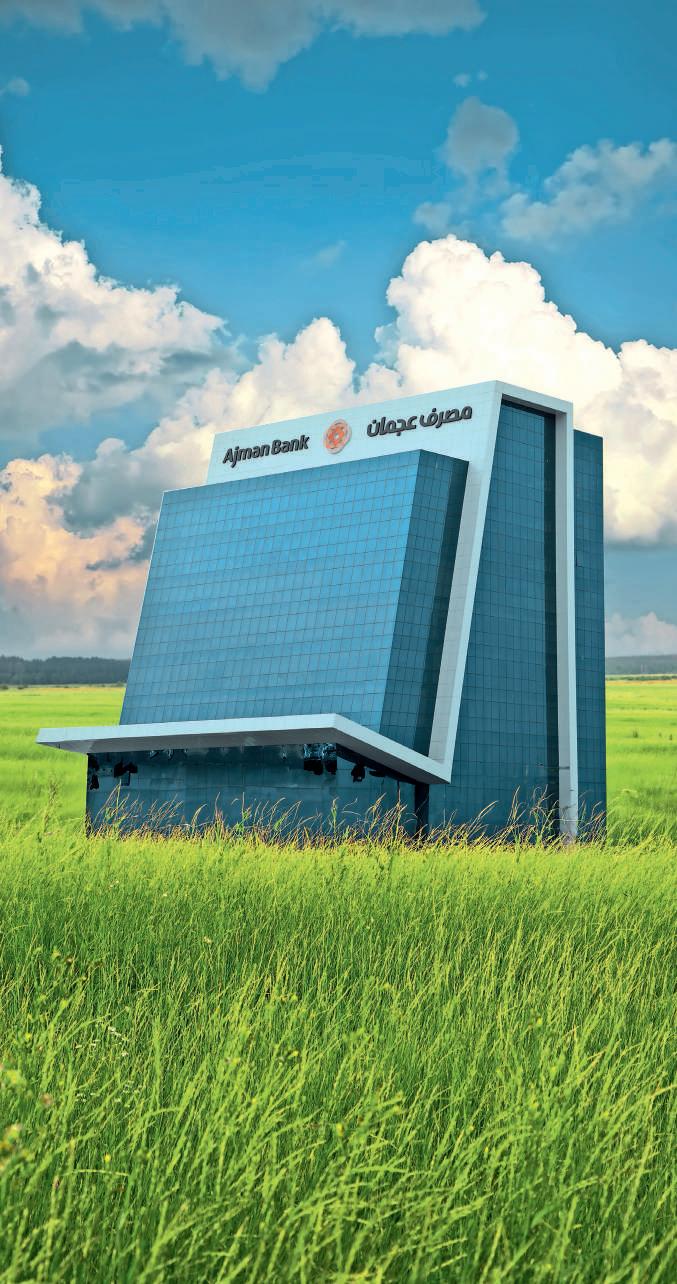
impact of its business on the climate. This vision guides the bank’s internal risk management, operational transformation, and externally directed business endeavours.
“We aim to leverage our core strength of specialization to help clients adopt sustainable business models, which in turn will enable them to benefit more from our sustainable finance programme,” explains Zohaib.
The bank is also establishing in-house advisory capabilities in its front-end institutional relationship management structures to support its client base.
While larger businesses have tailored their models towards sustainability, many small and medium enterprises (SMEs) have yet to address the realities of climate change. Consequently, ESG decisionmaking data is often unavailable for banks, impeding their ability to support such clients in transition and physical risk management. Zohaib views data availability as the biggest challenge facing the sustainable finance community globally. Ajman Bank is implementing technologies to address this challenge. “We are adapting our analytical systems to bridge data gaps as much as possible and address residual gaps through intelligent data remediation. Another challenge we see is that despite the buzz around ESG, some businesses are unable to clearly visualise the value of investing in a sustainable future for themselves. Therefore, we engage with them to create awareness and help them understand the risks and benefits of conducting business deals and projects sustainably,” says Zohaib.
The bank’s ESG programme aims to impact commercial enterprises, individuals, and communities. For example, the bank recently launched a family banking feature that enables families to gain financial literacy, develop joint financial plans, and promote saving and investment behaviours through the bank’s digital banking app, ‘Ajman Bank Connect’. This digital feature quickly gained popularity, and the app’s rating has risen to one of the highest-rated banking apps in the UAE.
Internally, the bank is upgrading its risk management framework, taking into consideration the risk and opportunity trade-offs and embedding ESG assessment into its core lending and investing decisions. It is also modifying its procurement processes to ensure it procures from sustainable resources. The bank is promoting internal initiatives towards
the use of biodegradable materials, reuse and recycle programmes, and energyefficient practices under its environmental stewardship programme.
“Our flagship ‘CarbonAware House Model’ programme aims to neutralise our own carbon footprint in a systematic and sustainable manner. We are committed to honesty, accuracy, and modesty in our sustainability disclosures, and we are systematically increasing the quality and depth of these disclosures. We also recognise the power of collaboration among banks and are open to joining hands with peer banks whenever we can create a positive impact,” says Zohaib.
“One of the key social aspects that we are passionate about, both internally and externally, is tailoring our services to people of determination. All our offices, branches, and website are designed to be accessible; our website is one of the few in the UAE that can be adapted to how the user wishes to view or listen to its content,” affirms Zohaib.
Ajman Bank is diverse in terms of gender, age, religion, and ethnic background, and it boasts a high ratio of female employees at all levels of hierarchy.
“This year, we proudly welcomed our first female board member, and we are continuously working on initiatives with prestigious global institutions to empower women in leadership roles. Our Emiratisation ratio is one of the highest in the UAE, and we won the coveted ‘NAFIS Award’ this year,” says Zohaib.
With green financing becoming significantly popular worldwide and, in the UAE, Ajman Bank identifies and prioritises projects that have a tangible positive impact on the environment and society.
